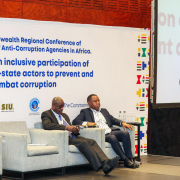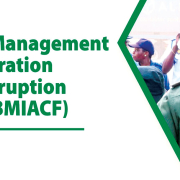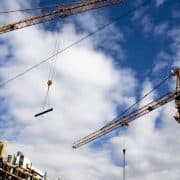|
Getting your Trinity Audio player ready...
|
By Kwazi Dlamini
Corruption Watch (CW), together with other government institutions, joins a new specialist anti-corruption forum focusing on the construction and infrastructure sector. The Infrastructure Built Anti-Corruption Forum (IBACF) aims to prevent and fight corruption in the implementation of the infrastructure investment plan. The investment plan seeks to address a history of massive infrastructure underspending by government and state owned enterprises, job creation, and to kick-start the economy through Infrastructure investment.
Minister of Public Works and Infrastructure Patricia de Lille and Special Investigating Unit head (SIU), Advocate Andy Mothibi, introduced the newly established IBACF in May 2021. The two entities are leading the forum, which is mandated to collaborate with other agencies in fighting fraud and corruption through criminal prosecutions and civil litigations.
The forum will also focus on corruption prevention by conducting risk assessments, awareness programmes, and detection, identification, monitoring, and reporting of corruption.
“The establishment of this forum is in line with the National Anti-Corruption Strategy (NACS) which the cabinet approved in 2020 to help step up the fight against corruption in the country. The NACS pillar 6 puts emphasis on protection of vulnerable sectors, and the infrastructure and construction sector is one of those that have been prioritised,” said De Lille.
She added that while the state already has structures in place, corruption in the sector has continued unabated for a long time and bringing in the private sector, public entities and civil society will improve their effectiveness in detecting and preventing corruption.
Civil society to play important role
Karam Singh, head of Legal and Investigations at CW, which is currently the only civil society representative on the forum, lauded the collaboration, saying such forums are important because they give civil society the opportunity to help set the anti-corruption agenda in the sector.
“Civil society can help share information; can help inform anti-corruption practice in terms of principles of accountability, transparency and good governance,” he said. “Civil society can help set the agenda and can feed information into the forum around allegations of corruption that require investigation. In this way civil society can help ensure that legitimate investigations are initiated.”
Echoing De Lille’s words, Singh said the creation of forums such as the IBACF helps focus anti-corruption efforts on particular issues and specific sectors because corruption issues have distinct characteristics in different areas.
“The IBACF is the only body of its kind dedicated to infrastructure. Infrastructure is meant to be the engine of economic development going forward, as laid out by government’s plans. However, the current system is characterised by weak systems where corruption is able to thrive – particularly in the area of public procurement, which is key to infrastructure development,” said Singh.
CW has, in the past, called for severe penalties for those found to be involved in rigging bids for the 2010 Soccer World Cup infrastructure projects. As far back as 2013, the organisation made a submission to the Competition Tribunal for the hearings into R1.46-billion settlement agreements facing big construction companies. The CW submission called for all those affected by the collusion in the construction industry to institute civil claims against offenders.
De Lille said the country needs better roads and schools, and generally better infrastructure for better services, but stealing money meant for infrastructure stifles progress. She added that those involved in corruption and found guilty must face the full might of the law. The collaboration of these institutions is hoping to achieve exactly that, and to pave a clear path to delivering quality infrastructure and attracting more investments.
The head of the Infrastructure South Africa project, Dr Kgosientsho Ramokgopa, said the launch of the forum will only cement their working relations with the SIU and further ensure greater transparency and accountability. ISA is the administrative arm responsible for monitoring the implementation of the infrastructure investment plan.








